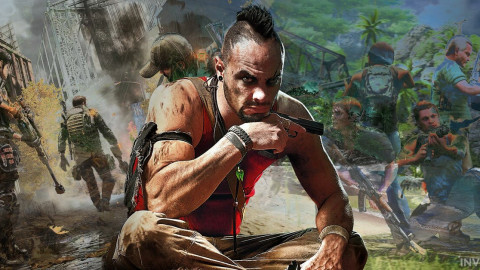
Earlier this week, Rick Fox released a short article detailing his impressions of the gaming world and the similarities he sees between traditional sports and esports. Fox’s praise and positive outlook regarding esports further legitimizes the competitive space and provides a voice that speaks for esports enthusiasts.
There’s no doubt that Rick Fox is one of the most influential figures in esports today. Despite being new to the arena, he has been one of the primary bridges between traditional sports and esports, having paved the way for the massive influx of sports club investments in 2016 following the success of Echo Fox in the LCS.
Unlike many others from the realm of traditional sports, Fox was never against esports. He was able to approach gaming with an open perspective—a perspective that was, in his words, without “intense skepticism”—due to a unique bond he shared with his son. While some have bashed esports as nothing more than a passing fad, Fox saw an environment that brought people together in much the same way that basketball and other sports did.
After attending the 2015 North American League of Legends Championship Series with his son, Fox had a revelation about the potential of esports as a legitimate branch of entertainment: “The level of passion and enthusiasm I witnessed was something I hadn’t experienced since my playing days. To put it plainly, I could say for certain that what was happening was real.”
Esports is a new frontier for both newcomers to the scene and even the veterans who have been working within it for years. Despite sharing some characteristic traits, esports is fundamentally different from any form of entertainment that has ever existed, and those who pioneered it had no precedent to draw from. The industry developed alongside technology since day one, from small LAN parties with friends to large scale tournaments streamed to thousands of viewers worldwide. Similarly, Fox had no footsteps to follow when he set out to create his own esports franchise.
“But unlike my time with North Carolina, the Celtics and the Lakers, when the company I kept was built for me, there was no organization to join. And there weren’t any mentors like Larry Bird waiting in the locker room with words of wisdom. For the first time in my life in professional sports, there was no Red Auerbach or Jerry West guiding me. I would need to build my own team to support me.”
Like the many others who learned the esports business the hard way, Fox took it upon himself to forge his own path. Luckily, his intuition and quick learning skills served him well. He teamed up with Amit Raizada of Spectrum Business Ventures to begin building a business enterprise and later hired former Warner Bros. executive Jace Hall as CEO. Together, the three of them worked to realize Fox’s dream of creating a new esports franchise, Echo Fox.
In late 2015, Rick Fox purchased Gravity Gaming’s LCS spot for a reported $1 million. Unfortunately, there wasn’t much of a team by the time Fox took control, but he wasn’t afraid to bring in new players and build the roster from the ground up. He found the all-star player Henrik “Froggen” Hansen—who revolutionized the way the game was played back in 2012 during League of Legends’ infant stages—and established him as the backbone of the team, building the rest of the roster around him.
Fox’s insistence on calling pro players “athletes” is just one of the many ways he has bridged the gap between the two realms of esports and traditional sports. “What struck me were all the similarities he shared with the great players I had come across during my NBA career,” he stated when describing Froggen. “This was someone who focused intensely on one thing for 16 hours a day because he was driven to be the best at it. The only difference between him and guys like Kobe Bryant and Larry Bird was name recognition.” Just as the greatest athletes of all time are lauded for their determination and work ethic, pro gamers share the same relentless dedication to the game, often times spending 12 or more hours every day just to improve their skills—something Fox noticed very early on.
Here is Rick Fox trying to explain pro gamers to a room full of oblivious people
Echo Fox’s first year of competition in the LCS wasn’t very successful, only barely escaping relegation twice, but the franchise itself thrived. Now with additional teams in a wide range of games and genres, including CS:GO, Call of Duty, H1Z1, Gears of War, Vainglory, Street Fighter, and Super Smash Bros. 4 , Echo Fox has quickly become an esports empire that will likely last for many years to come.
The success of Echo Fox is a huge deal when it comes to outside investors looking to enter the fray. LCS is full of stories about teams and franchises that stagnated, got relegated, and then died shortly thereafter. Echo Fox demonstrates that building a diverse portfolio with the right players and management can be successful and lucrative.
Since the inception of Echo Fox, at least 16 other sports figures or franchises have invested in esports, most notably Shaquille O’Neal, Alex Rodriguez, Jonas Jerebko, the Golden State Warriors, FC Schalke, and the Philadelphia 76ers. This marked shift in attitude from football and basketball organizations toward esports has served as a signal for additional investors and sponsors to get involved. As a result, the field is growing at an astronomical rate, with global revenues projected to double to $1.5 billion by 2020.
Fox wasn’t always so gung-ho on esports; it took him some years to get familiar with it, according to Echo Fox CEO Jace Hall during an interview. Speaking candidly, Hall remarked that “Rick was a video game player always”, he just didn’t know; it took him some time, but after going deeper into esports for some years, Fox finally had enough understanding to take on the monumental task of building an esports franchise.
“The language of sport is the same,” Fox claims, “but the dialect is different. That’s what takes a little time to learn.” Sports clubs and other non-endemic sources are still in the process of learning the dialect of esports and how it pertains to the modern world. The esports industry is booming, but it’s still difficult for outsiders to grasp why it’s booming. It will take time for investors to understand the dialect of the industry and how it functions differently compared to the world of traditional sports.
Perhaps the most important contribution Rick Fox has made to the realm of esports has been the legitimizing factor of recognition. Professional players in esports have always had social tensions with those that don’t understand the amount of work and dedication that goes into becoming the best player in the world. “Our team treats our players the same as if they were professional athletes, because that’s what they are,” Fox explains. His persistence in finding common ground between the athletes he’s known in basketball and the athletes in esports is astonishing, and it’s slowly convincing others to follow suit.
As the gap between esports and sports begins to narrow and each entity begins to understand the other, there’s no doubt that each will flourish in turn. However, there are still plenty of social hurdles to overcome in the meantime. Video games are often carry a negative stigma, but Fox’s efforts are helping to bridge the gap in understanding. When outsiders ask about the esports industry, Fox explains his position:
“Over the past couple of years I’ve spoken to numerous people who have asked me what this industry is all about. I always explain to them that e-sports is just the next evolution of competition; that it’s so much more than whatever stigmas you might have associated with gaming in the past.”
Gaming culture is still far from being widely understood or accepted, but every step by non-endemic investors is a step closer to mainstream acceptance.
Whatever the future holds, Fox’s impressions of the gaming world ring true for many esports fans. He isn’t necessarily a hero, but he’s certainly a voice we’ve been craving, one that validates our conviction that what’s happening in esports is, in fact, “real”.
Nothing says it better than Fox’s own words: “I tell them what millions already know: E-sports isn’t the wave of the future—the future is already here.”
Sort by:
Comments :0






